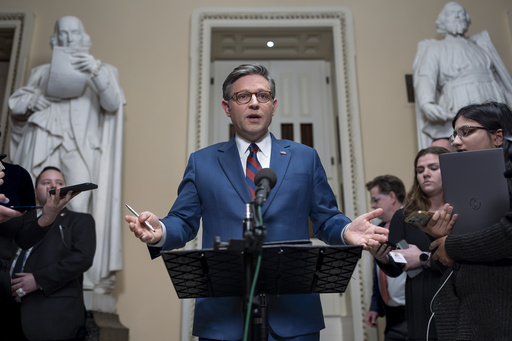
“`html
WASHINGTON — On the brink of a potential government shutdown, the House decisively rejected President-elect Donald Trump’s recent funding proposal on Thursday, with both Democrats and many Republicans unwilling to comply with his last-minute requests. The vote, held in an atmosphere of palpable frustration, fell far short of the two-thirds majority needed for approval, ending with a tally of 174-235 against Trump’s plan. House Speaker Mike Johnson vowed to reconsider options ahead of the midnight deadline on Friday.
Following the vote, Johnson expressed determination to devise a new solution: “We’re going to regroup and we will come up with another solution, so stay tuned.” This setback is a significant challenge for Trump and his affluent supporter, Elon Musk, who denounced bipartisan efforts made earlier by Johnson and some Democratic leaders to stave off a seasonal government closure.
This incident serves as an early warning of the political turbulence likely to unfold when Trump resumes his presidency with Republican dominance in the House and Senate. During his initial term, Trump orchestrated the longest government shutdown in history during Christmas 2018, and he similarly disrupted the 2020 holiday season by rejecting a bipartisan COVID-19 relief bill, forcing a redo.
Earlier on Thursday, Trump proclaimed “SUCCESS in Washington!” regarding his newly proposed package aimed at keeping the government functioning for an additional three months. This plan included $100.4 billion in disaster assistance, particularly for regions affected by hurricanes, and would extend borrowing capabilities until January 30, 2027. Trump touted the agreement with the statement, “Speaker Mike Johnson and the House have come to a very good deal.”
However, after spending a day discussing and revising the proposal within their ranks to remove conservative objections, Republicans encountered a firm wall of disapproval from Democrats. They were not inclined to yield to Trump’s proposals or to Musk’s influence. House Democratic Leader Hakeem Jeffries firmly rejected the latest proposition as “laughable” and affirmed that they were committed to the original agreement he had negotiated with Johnson.
“It’s not a serious proposal,” Jeffries stated as he headed into a closed-door meeting with fellow Democrats, who were vocally opposed to the new plan, chanting “Hell, no!” throughout the session. Johnson’s attempt to balance Trump’s intricate demands while maintaining his leadership role placed him in a precarious position as federal offices began preparations for a shutdown.
The worked-over plan condensed a 1,500-page document into just 116 pages, removing various add-ons including a proposed pay raise for lawmakers—the first in over ten years—which could have permitted a raise of up to 3.8%. This decision drew strong backlash, particularly as Musk encouraged criticism of the legislation through social media.
Trump warned that Johnson could secure his role as speaker for the upcoming Congress if he effectively addressed the debt limit issue, which was a particularly controversial topic just before the holiday season. He cautioned members of Congress about the repercussions of supporting initiatives that fail to adequately address debt ceiling concerns for the Republican Party.
The recent developments starkly mirror the turbulent dynamics often seen in Trump-led Washington. Musk and incoming Vice President JD Vance attempted to shift blame towards the Democrats, claiming they wanted a shutdown. “They’ve asked for a shutdown,” Vance asserted, implying that this was the outcome they desired.
For Johnson, navigating Trump’s demands has left him considerably weakened, as he had to reverse his commitments to Democrats while working late to forge a new proposal. Suggestions even emerged among Trump’s allies, albeit absurdly, to grant Musk the role of speaker, highlighting the party’s strife.
Democratic leaders expressed their frustrations, particularly given the backdrop of a Congress characterized by inefficiency. “Here we are once again in chaos,” remarked House Democratic Whip Katherine Clark, emphasizing the impact that a shutdown would have on American citizens, attributing the crisis to Musk’s and Trump’s influence over congressional decision-making.
As the atmosphere heated in the House chamber, lawmakers launched accusations against one another regarding the turmoil. The frustration culminated when Rep. Marc Molinaro, presiding over the session, struck the speaker’s gavel so forcibly that it broke.
The stakes were high, with Trump publicly denouncing colleagues who opposed his stances. One notably hard-lined Republican, Rep. Chip Roy of Texas, caught Trump’s ire for his lack of support. He chastised his fellow Republicans for compromising their principles regarding national debt.
The streamlined proposal does allocate federal funds for the restoration of Baltimore’s Key Bridge, though it omitted plans that could have facilitated a new stadium for the Washington Commanders. It also abandoned other bipartisan initiatives that held favor among lawmakers striving to conclude their legislative business for the year. Funding would temporarily extend through March 14.
Incorporating a debt ceiling increase into what had primarily been a bipartisan proposal is contentious among Republicans who generally oppose borrowing more funds. A sizable minority of Republicans voiced opposition, illustrating the divide within the party.
Although Democrats have previously floated ideas for modifying or eliminating debt ceiling limits, they appear unready to negotiate in a way that would benefit Johnson against Trump’s imperatives—even prior to Trump’s official entry into office.
The current debt limit is set to expire on January 1, 2025, and Trump aims to resolve the matter before he takes office. Musk, flexing his newfound political influence, actively galvanized criticism against the bipartisan effort, causing GOP lawmakers to receive a flood of calls urging them to stand against the proposal.
Rep. Steve Womack, a senior appropriator from Arkansas, noted that the failure of this bipartisan bill may foreshadow the challenges ahead for the upcoming Congress. The White House had reportedly alerted agencies about potential shutdown measures in advance, signaling the seriousness of the developments.
As Johnson departed the Capitol late Thursday, he simply stated, “We’ll see,” when asked about the future course of action.
“`
